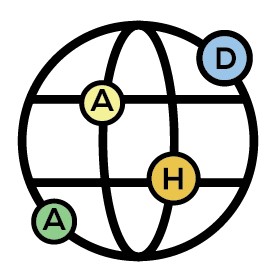Submissions
Submission Preparation Checklist
As part of the submission process, authors are required to check off their submission's compliance with all of the following items, and submissions may be returned to authors that do not adhere to these guidelines.- The submission has not been previously published, nor has it been submitted to any other journal (or an explanation has been provided in Comments to the Editor).
- The submission file is in OpenOffice, Microsoft Word, RTF, or WordPerfect format.
- Wherever possible, URLs are provided for references.
- The text is 1.5 spaced; 12-point font size; italics are used instead of underlining (except in URLs); and all graphics and tables are integrated into their appropriate positions within the text instead of being appended at the end.
- The text adheres to the stylistic and bibliographic requirements outlined in the Author Guidelines, which appear in About the journal.
Research Articles
Research articles: those that contain results of scientific research and that represent an original contribution to general or regional knowledge. These articles seek to discuss a hypothesis or make, from a theoretical point of view, a novel contribution to the topic. Maximum 10,000 words.
Download and use this template to write your article.
Make a new submission to the Research Articles section.
Data-Articles
Descriptions of accessible and reusable research data sets along with related information or metadata on the research process, methods and data collection considerations, formats, and specific conditions. Attention is recommended to FAIR (Findable, Accessible, Interoperable, Reusable) and CARE (Collective benefit, Authority to control, Responsibility, Ethics) principles. They can be small data sets in csv formats, etc. These data do not strictly have to belong to research projects but can be part of more experimental activities and/or account for negative results. The data should be accessible from an institutional or general repository or a specific one, such as our Zenodo Digital Humanities repository.
Download and use this template to write your article.
Make a new submission to the Data Articles section.
DH in action
Use cases in Digital Humanities. It can be the description of a specific scenario or use case where a certain corpus or example is worked with an open or free software or tool. It can be a pedagogical experience with some method, programming or markup language, or with some software or tool in the field of Digital Humanities. In no case will cases worked with proprietary software be published, as they hinder peer review and the possibility of replicating the scenario by readers. Maximum 8,000 words.
Download and use this template to write your article.
Submit a new article to the DH in Action section.
Article Translations
Translations of scientific or informative articles, and blog posts of interest to the digital humanist community. Special emphasis will be given to translations into English, in order to give visibility to research conducted in countries that use Spanish for scientific communication outside of Latin America. You can use the article template for your translation, including your name in the header with the translation role. Translations do not include an abstract, only retaining that of the work to be translated if it has one.
Make a new submission to the Article Translations section.
Reviews
Reviews of books, articles, tools, and research projects.
Maximum 5,000 words.
Download and use this template to write your review.
Make a new submission to the Reviews section.
Copyright Notice
The authors who publish in this journal agree to the following terms:
- The articles published in the journal are available in open access.
- The authors retain copyright and grant the journal the right to be the first publication of the work as well as license it under a Creative Commons Attribution-ShareAlike 4.0 International License (CC BY-SA 4.0), which allows you to copy and redistribute the material in any medium or format and to remix, transform, and build upon the material under the following terms: you must give proper credit, provide a link to the license, and indicate whether any changes have been made; You may do so in any reasonable way, but not in any way that suggests that you or your use is endorsed by the Licensor. If you remix, transform, or build upon the material, you must distribute your contribution under the same license as the original.
- Authors may deposit the work in a preprint or postprint repository, establish separate agreements for non-exclusive distribution of the published work in the journal (such as placing it in an institutional repository or publishing it in a book), with acknowledgment of its initial publication in this journal.
- Authors are encouraged to deposit data in SEDICI or any other research data repository (such as Zenodo, where AAHD has created a thematic repository for DIGITAL HUMANITIES) prior to submitting the contribution to the journal. Thus, when submitting the article, only the URL where the research data can be found should be indicated.
Privacy Statement
The names and email addresses entered in this journal site will be used exclusively for the stated purposes of this journal and will not be made available for any other purpose or to any other party.

























